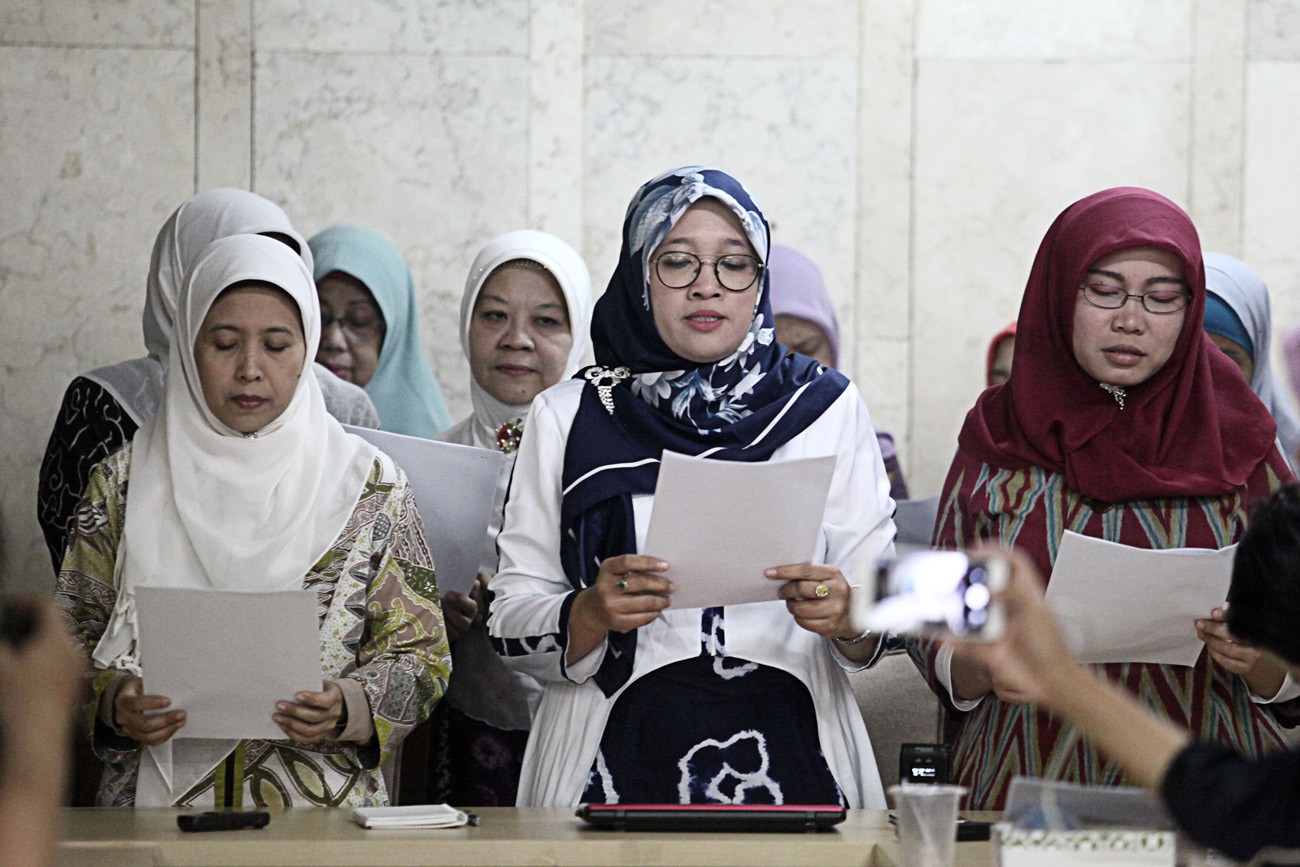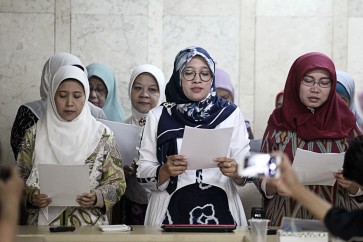Popular Reads
Top Results
Can't find what you're looking for?
View all search resultsPopular Reads
Top Results
Can't find what you're looking for?
View all search resultsEmpowering women ulama’s participation in peacebuilding
If by being religious we actually make enemies of other people, we may need to reconsider our sincerity in our religion, or our religious studies may need further broadening.
Change text size
Gift Premium Articles
to Anyone
 Calling on unity: (From left to right) Badriyah Fayumi, leader of the Mahasina Islamic boarding school (Pesantren) in Bekasi, West Java (left), Hindun Annisah of Pesantren Hasyim Asy’ari in Jepara, Central Java (center) and Yulianti Muthmainnah of Aisyiyah, the women’s wing of Indonesia’s second-largest Muslim organization Muhammadiyah read out a joint statement after a meeting of Indonesian women ulemas at Istiqlal Grand Mosque in Central Jakarta on March 1, 2017. (JP/Dhoni Setiawan)
Calling on unity: (From left to right) Badriyah Fayumi, leader of the Mahasina Islamic boarding school (Pesantren) in Bekasi, West Java (left), Hindun Annisah of Pesantren Hasyim Asy’ari in Jepara, Central Java (center) and Yulianti Muthmainnah of Aisyiyah, the women’s wing of Indonesia’s second-largest Muslim organization Muhammadiyah read out a joint statement after a meeting of Indonesian women ulemas at Istiqlal Grand Mosque in Central Jakarta on March 1, 2017. (JP/Dhoni Setiawan)
T
hroughout history, we have witnessed strife, war, destruction, conquering and violence. Not prosperity, peace or development. We do not know if the future will usher in a new era of peace and tolerance, or whether we will revert to a culture of conflict in all its manifestations.
Domestic political struggles and social instability in many nations, as well as racism, genocide and war, demonstrate that the spread of peace and tolerance, as well as the establishment of a culture that promotes these concepts, is critical for the survival of every human being, family, organization, state and society.
The establishment of a culture of peace and tolerance is essential for the salvation of humanity, as it leads to a shared grave. Consequently, a culture of peace must be created through the spiritual enrichment of each individual and the whole community.
As a result, the concept of peace will affect the spiritual and moral values of every individual. These values will also govern each individual's thinking and attitude, as well as their creative abilities and other actions. Civilization can only be perpetuated, peace and harmony achieved and chances for human progress developed with this culture.
Being part of the King Abdullah bin Abdulaziz Interreligious and Intercultural Dialogue (KAICIID) fellow network, I felt privileged to accept an invitation to participate in a regional consultation meeting session for the Asian region organized by The Network for Religious and Traditional Peacemakers, where we met, discussed and listened together with different grassroots religious actors. This forum was designed to dig deeper into the various roles of religious/traditional leaders in peacebuilding, which would later be used as advocacy materials at the United Nations level to engage traditional actors more in peace initiatives.
Certainly, this discussion was not purposeless, since the approach to the peace process so far has frequently been limited, focusing only on elite negotiating, political dispute resolution and the cessation of hostilities, rather than delving into underlying issues and searching for structural causes of conflict.
High-level discussions between conflicting parties can sometimes be exclusive, relatively ineffective in engaging all relevant actors and incapable of having a long-term peacebuilding impact. These issues mean the process of constructing peace can be long and uneven, primarily due to a lack of political commitment, which can even give the impression that there is a conflict reserve, so that one day the potential conflict would resurface, especially when there are demands from some stakeholders.


















